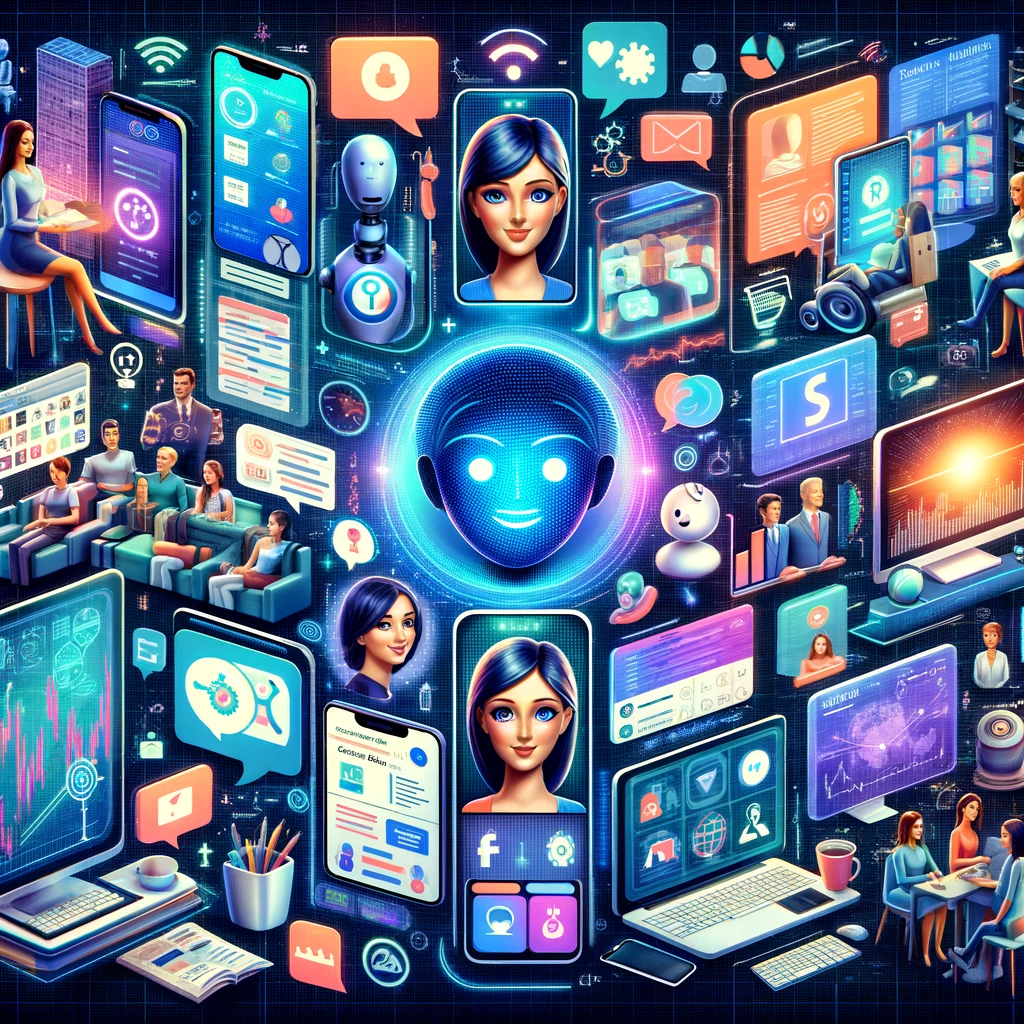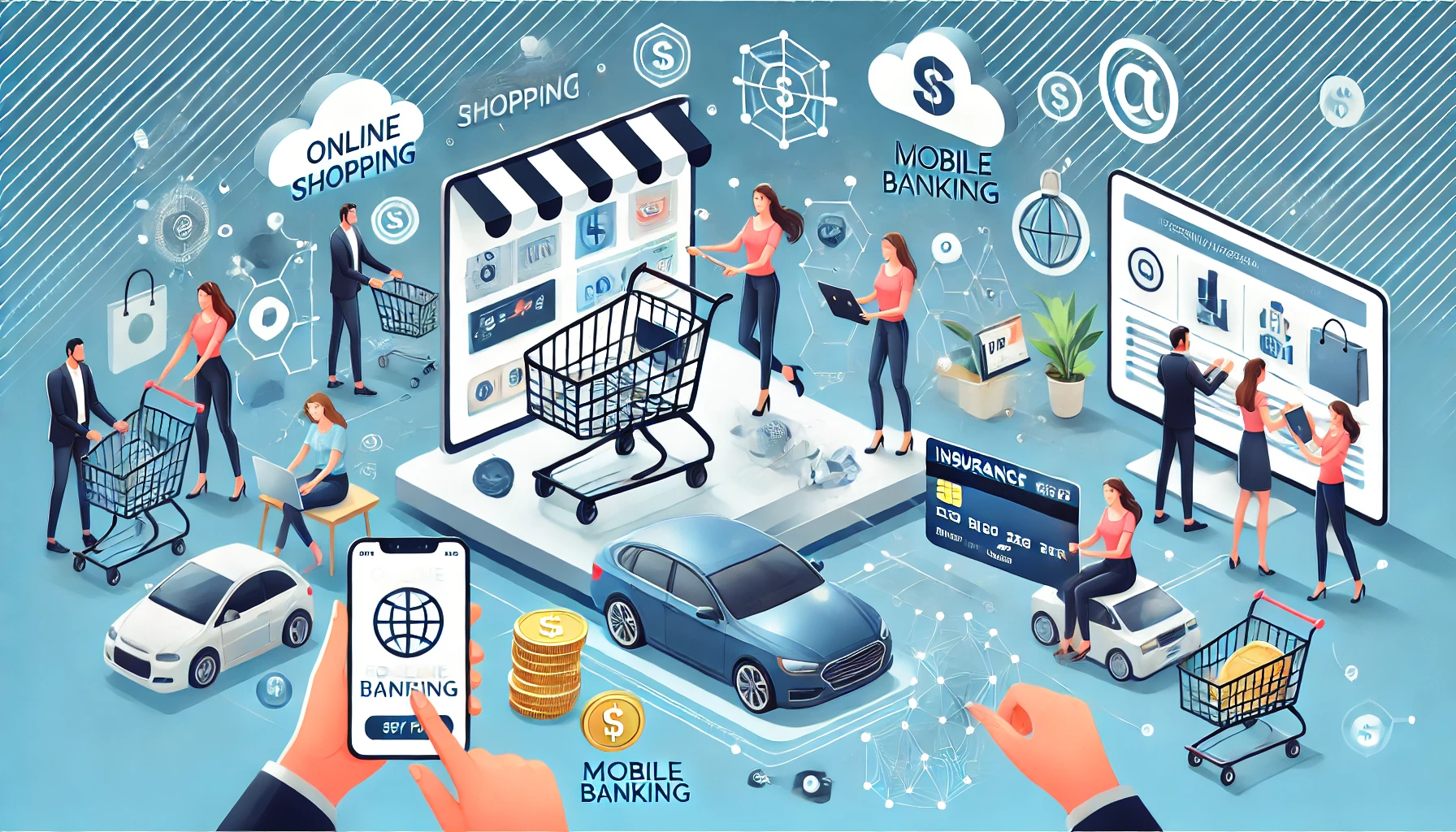INTRODUCTION
AI-powered personal assistants have become an integral part of our daily lives. These virtual assistants, driven by cutting-edge AI technology, are revolutionizing the way we live and work. With their advanced capabilities and potential for future advancements, AI-powered personal assistants are shaping the future of virtual assistants.
(AI) has emerged as a transformative force in reshaping the way we work and communicate. In recent years, AI-powered personal assistants such as Siri, Alexa, and Google Assistant have become extremely popular. These virtual assistants utilize natural language processing and machine learning algorithms to comprehend and address user commands and inquiries. They can execute a wide array of tasks, ranging from setting reminders and sending messages to playing music and managing smart home devices
One of the most notable advancements in this technology space is the development of AI-powered virtual assistants, and among them, ChatGPT has taken the spotlight. In this article, we’ll explore how AI-driven virtual assistants are revolutionizing the workplace.


WHAT IS A VIRTUAL ASSISTANT (AI ASSISTANT)?
A virtual assistant, also called an AI assistant or digital assistant, is an application program that understands natural language voice commands and completes tasks for the user. Such tasks – historically performed by a human personal assistant or secretary; include taking dictation, reading text or email messages aloud, looking up phone numbers, scheduling, placing phone calls and reminding the user about appointments.
Virtual assistants can provide a wide variety of services, such as:
- Providing information, including weather, facts from sources like Wikipedia or IMDb, setting alarms, making to-do lists, and shopping lists.
- Playing music from streaming services like Spotify and Pandora, playing radio stations, and reading audiobooks
- Playing videos, TV shows, or movies on televisions, streaming from services like Netflix.


TYPE OF VIRTUAL ASSISTANTS
With the evolution of chatbots and generative AI, various types of virtual assistants have gained popularity. However, they serve different purposes for customers and provide different levels of assistance.
Common types of virtual AI assistants include the following:
? AI chatbots: AI chatbots are computer programs that simulate human conversation with an end user. They use natural language processing (NLP) and other AI technologies to understand and respond to user commands and queries. AI chatbots can improve customer experiences with virtual agents trained on a business’s content and lower costs, and scale customer support. They can act as the sole point of customer contact, support human agents at call centers, recommend answers generated on the fly, and field frequent customer inquiries. AI chatbots leverage AI, machine learning (ML), NLU, NLP, and large language models (LLMs) to deliver human-like responses to human input.
? Conversational agents: A conversational agent, also known as a chatbot, is a type of artificial intelligence (AI) software that can simulate a conversation with users through natural language processing (NLP). These agents can understand and generate natural language content, using text, voice, or hand gestures, and are deployed as chatbots and virtual or AI assistants. They can be rule-based, following pre-defined rules and limited to specific tasks, or AI-powered, using machine learning and NLP to understand and respond to users, capable of handling more complex conversations.
? AI virtual assistants: These advanced virtual assistants can perform a variety of tasks, often across multiple devices and platforms. They frequently converse with users by using natural language through voice-based interactions. With these AI virtual assistants, users can easily and quickly access information and manage their calendars by integrating with a variety of services and applications.


THE CUTTING-EDGE CAPABILITIES OF AI-POWERED PERSONAL ASSISTANTS
As technology evolves, these assistants are expected to become even more integrated into our routines, shaping the future of personal and professional productivity. Here are some of the cutting-edge capabilities of AI-powered personal assistants:
- Natural Language Understanding: Natural Language Understanding (NLU) in AI assistants refers to the ability of computer software to comprehend and interpret human language, rather than just individual words. It enables AI assistants to analyze the sentiments, intentions, and implications behind a speaker’s statement, allowing for more natural and human-like interactions.
- Context Awareness: These virtual assistants can analyze contextual information to provide relevant and personalized responses. They can understand user preferences and adapt their behavior accordingly.
- Multi-Platform Integration: AI-powered personal assistants can seamlessly integrate with various platforms and devices, including smartphones, smart speakers, and smart home systems. This allows for a seamless and interconnected user experience.
- Voice Recognition: Voice recognition is a critical component of AI assistants, allowing them to understand and interpret spoken commands from users. Voice recognition software captures the user’s spoken command and converts it into text, which is then analyzed by natural language processing (NLP) algorithms to understand the intent of the user.
- Task Automation: AI technology empowers organizations to automate internal tasks by leveraging advanced algorithms and machine learning capabilities. By offloading repetitive and mundane tasks to AI systems, employees can focus on more engaging and challenging work, boosting job satisfaction and enhancing employee morale and retention. AI-powered task automation can encompass a wide range of features and capabilities, including natural language processing (NLP) for automated email responses, chatbot interactions, and voice recognition.


CHANGING THE DYNAMIC OF WORKPLACE COMMUNICATION
One of the key areas where AI-powered virtual assistants like ChatGPT are making an impact is in workplace communication. Here’s how:
? Efficient Information Retrieval: AI-powered personal assistants are revolutionizing the way we retrieve information, making it more efficient and accessible. These assistants use advanced algorithms and natural language processing to understand user queries and provide relevant information from various sources. Some key features of AI-powered personal assistants for efficient information retrieval include:
- Intent Recognition: AI assistants can understand the meaning behind user queries, allowing them to provide accurate and relevant information
- Semantic Search: These assistants can quickly locate related content without entering precise keywords, improving retrieval efficiency
- Speech-to-Text: AI assistants can convert spoken queries into text, enabling users to interact with them using voice commands
? 24/7 Support: Unlike human assistants, AI-powered virtual assistants are available round the clock. They can assist employees with tasks and answer queries at any time, eliminating the need to wait for business hours or the availability of human colleagues.
? Multilingual Support: In a globalized workplace, language barriers can be a challenge. Virtual assistants like ChatGPT can provide instant translations and support communication between colleagues who speak different languages, fostering collaboration on a global scale.


ENHANCING PERSONAL PRODUCTIVITY
? Personalized Assistance: ChatGPT and similar virtual assistants can learn user preferences and adapt to individual work styles. This personalization leads to more efficient and tailored support.
? Scheduling and Reminders: Virtual assistants can manage your calendar, schedule meetings, and send reminders, ensuring you stay organized and never miss important appointments. They can analyze patterns and preferences, allowing them to understand user needs, whether communicated verbally or in writing. AI scheduling assistants can suggest the best meeting times by considering availability, co-workers’ schedules, time zones, and location preferences.
? Content Creation: Writing emails, reports, or content for presentations can be time-consuming. AI-driven assistants can assist in drafting documents, saving users valuable time. Additionally, there are specific AI content creation tools such as ChatGPT, Midjourney, Jasper AI, and Owl Writer, which produce text-based or visual content using AI. These tools can be beneficial for social media marketers, as they can help in making multiple variations of short form copy, suggesting ad copy, and more. Furthermore, AI content creation tools can save valuable time in social media marketing efforts by suggesting content ideas, generating text, creating and enhancing visuals for social posts, and even generating video scripts for various social media platforms
? Continuous Learning: AI virtual assistants continuously learn and improve, meaning they become more effective over time. This translates into increasingly valuable support for users. By incorporating continuous learning capabilities, AI assistants can:
- Learn from user interactions: AI assistants can analyze user interactions and feedback to understand their preferences and improve their performance.
- Adapt to changing contexts: Continuous learning enables AI assistants to adapt to new situations and contexts, expanding their knowledge and abilities.
- Stay up to date with the ever-changing world: By continuously learning, AI assistants can evolve and stay current with the latest trends and advancements in their respective fields.
THE FUTURE OF AI-POWERED PERSONAL ASSISTANTS
The future of AI-powered personal assistants holds even more exciting possibilities. As AI technology continues to advance, virtual assistants will become even smarter and more capable. Here are some potential future advancements of AI-powered personal assistants:
- Enhanced Natural Language Processing: AI-powered personal assistants will further improve their ability to understand and process natural language. They will become more conversational and better at understanding complex queries.
- Emotional Intelligence: Virtual assistants may develop emotional intelligence, allowing them to understand and respond to human emotions. This could enable more empathetic and personalized interactions.
- Advanced Personalization: AI-powered personal assistants will become better at understanding user preferences and providing personalized recommendations and suggestions.
- Improved Context Awareness: Virtual assistants will continue to enhance their context awareness, allowing them to provide more relevant and timely information based on the user’s current situation.
- Integration with IoT Devices: AI-powered personal assistants will seamlessly integrate with a wide range of IoT devices, enabling users to control and manage their smart homes, cars, and other connected devices effortlessly.
CONCLUSION
AI-powered personal assistants have already made a significant impact on our daily lives, and their potential for future advancements is truly exciting. With their cutting-edge capabilities and continuous evolution, these virtual assistants are set to play an even more significant role in shaping the future of technology and productivity. They are also anticipated to become more proactive, not merely responding to direct queries but anticipating needs and providing solutions even before they are requested. As technology evolves, these assistants will become even more integrated into our routines, making tasks simpler and more efficient, and ultimately shaping the future of personal and professional productivity.
SMARTDEV’S ROLE IN SUPPORTING BUSINESSES TO APPLY VIRTUAL ASSISTANT IN THEIR WORK
SmartDev’s AI solutions can help businesses leverage AI technology to create seamless, personalized, and customer-centric experiences. They can assist in implementing AI-based customer service systems for fintech apps, providing investment advice, and handling customer queries. SmartDev’s AI solutions can also help businesses automate tasks, improve natural language understanding, and enhance content creation. Additionally, SmartDev’s AI solutions can learn from user interactions, adapt to changing contexts, and stay up-to-date with the latest trends and advancements in their respective fields, ultimately improving their performance and relevance over time,
Additionally, SmartDev offers AI consulting, strategy development, solution development, and data analytics services, empowering businesses, including startups, to leverage the transformative power of AI. By partnering with SmartDev, businesses can gain a competitive edge, unlock new opportunities, optimize operations, and deliver exceptional customer experiences through the implementation of AI, including virtual assistants.



